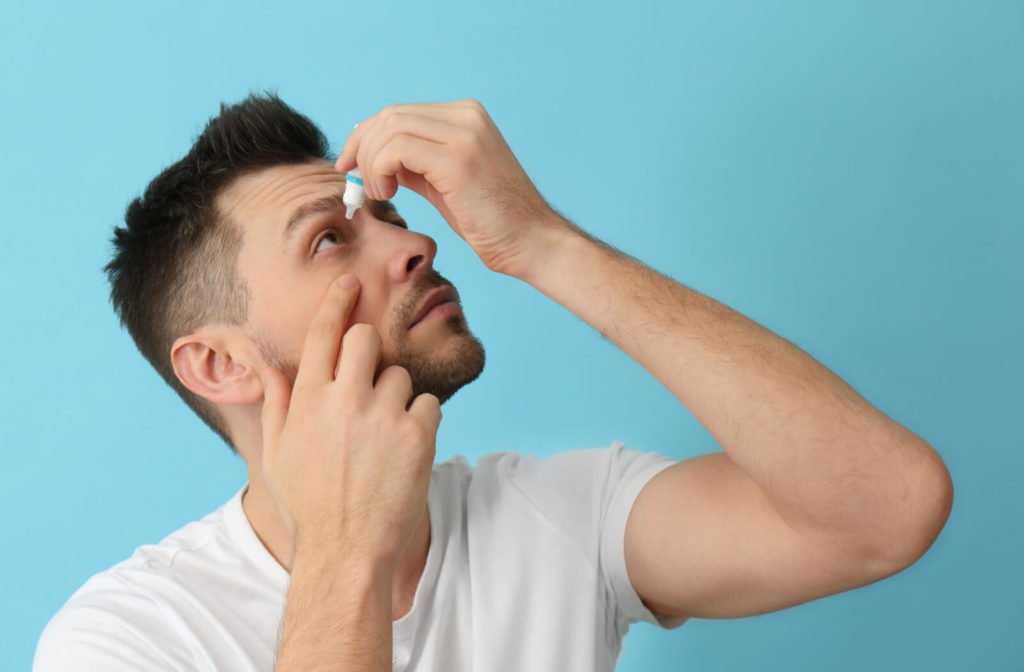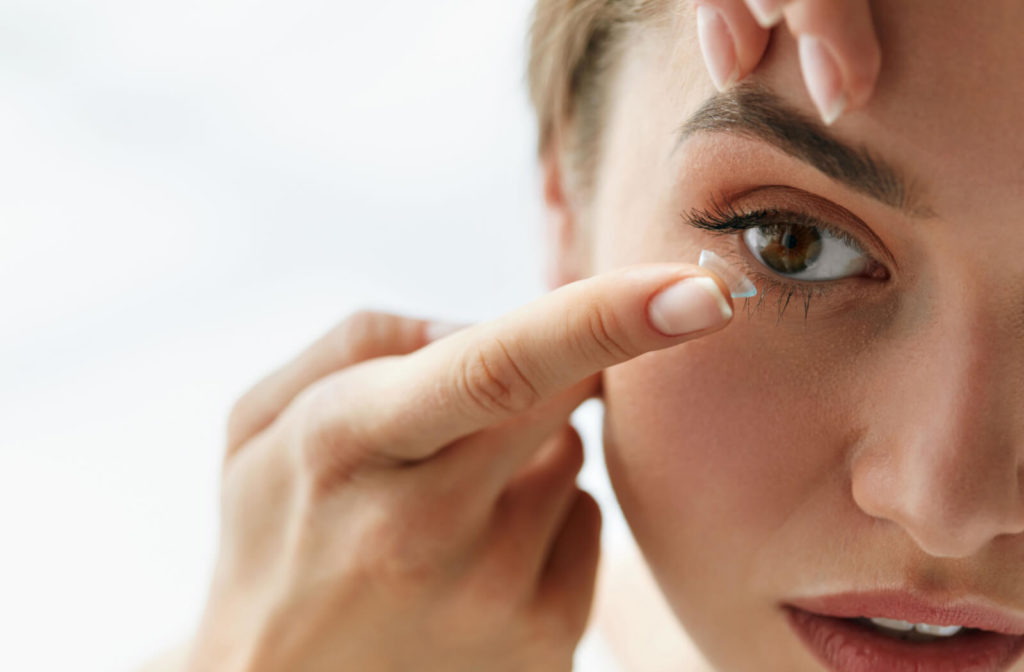Clear, comfortable vision—it’s something that everybody deserves. But when you get that burning dry eye sensation, like there’s a piece of sand trapped under your eyelid, it can be irritating! So how do you keep your vision clear when you have dry eyes? Can you still wear contact lenses?
Yes, you can wear contacts with dry eyes. There are types and brands of contacts that can be ideal for those with dry eye. However, if you’re feeling dry eyes that don’t resolve, it might be a good idea to switch back to your eyeglasses until symptoms go away or you speak to your eye doctor.
What Is Dry Eye?
Your eyes disperse a thin film of tears every time you blink. These tears protect the eye from dust and dirt, all while keeping it hydrated and clean. But when a problem develops with the tear film, the eyes are unprotected. They can become irritated, inflamed, and uncomfortable.
This tear film is made of three layers:
- The mucous layer that keeps the tear attached to the eye
- The water layer, which makes up most of the tear and helps wash away irritants
- The oil layer, which stops the tear from evaporating too quickly and keeps the outside of the tear smooth and clear
When there’s a problem with these layers, the natural balance of your tear film gets disrupted. It can lead to the tears evaporating too quickly or not enough tears in general being produced. So, instead of being protected, the eye is vulnerable and dry—hence “dry eye.”
Contacts for Dry Eyes
When you have dry eyes, you might be wondering what you can do. Fortunately, our team at Total Vision Diamond Bar offers specialty contact lenses for dry eyes. Our options include:
- Scleral lenses
- CooperVision lenses
- Dailies Total-1
- Biofinity lenses
Scleral Lenses
Normally, a contact lens comes into direct contact with your cornea. But when you have dry eyes, the cornea gets easily irritated. That’s where scleral lenses come in.
Instead of touching the cornea, these lenses sit on the whites of your eyes, called the sclera, and arch over the cornea to rest on the sclera on the other side of the eye. This creates a small gap between the cornea and the lens where tears get trapped. There, they keep the eye hydrated and comfortable.
CooperVision Lenses
CooperVision, the creator of several innovative lenses, believes in treating your eyes as a whole. That’s why they offer the Clarity 1-Day Vision. These are daily disposable lenses with a high water content and an extra twist—they’re built from a material that attracts water molecules and binds them to the surface of the eye to prevent dryness and irritation.
Dailies Total-1
The Dailies Total-1 lenses are designed specifically with dry eye in mind. The material is designed to provide a surface that’s more than 80% water, similar to the natural surface of your eye. This helps let oxygen reach the eye, prevents dryness, and promotes a comfortable experience.
Biofinity Lenses
Biofinity, a popular lens manufacturer, created a lens that incorporates a naturally wettable material. This material attracts water, so you don’t need any wetting agents or special coating for the lenses. Instead, this property helps prevent the eye from drying out, bringing you relief from those dry eyes.
What Causes Dry Eyes?
This imbalance with the tear film can be caused by a few things. Often, it’s due to the meibomian gland having a problem. This gland produces the oils needed to keep your tears from evaporating; when there’s a problem with oil production, the tears evaporate too quickly and can’t do their job.
It isn’t the only cause, though. Problems with the tear film can be caused by:
- Exposure to dry, smoky, or windy conditions
- Nutritional deficiencies
- Medications, including antihistamines or decongestants
- Hormonal imbalances, like those caused by menopause
- Medical conditions, including diabetes, Sjogren’s syndrome, or rheumatoid arthritis
It is essential to get a proper diagnosis for your condition, because of the many different factors that can lead to dry eyes.
Why Do Contacts Make Dry Eyes Worse?
It’s important to note that dry eyes can vary in severity. If you don’t notice many symptoms and just feel a little irritation, you may be okay with continuing to wear your contacts.
Because contact lenses come into direct contact with the surface of your eye, they can irritate an already inflamed area. Contacts can also create a barrier for oxygen to reach the eye—something that they need to stay healthy.
Wearing contacts can disrupt your tear film or trap dust and dirt under the eyelid. Because of all of this, it can help to:
- Choose contacts made specifically for dry eyes
- Use eye drops when possible
- Never sleep in your contacts
- Wash your hands before and after handling the lenses
- Never use out-of-date materials or lenses
- Take regular breaks from wearing your contacts
It can often help to switch back to your eyeglasses until your dry eye symptoms recede. While it may not be ideal, there’s no need to make your symptoms worse!

Can You Treat Dry Eyes?
The good news is that dry eyes are highly treatable. Treatment usually aims to restore the natural balance of the tear film to keep your eyes protected and vulnerable.
Here at Total Vision Diamond Bar, we often recommend eye drops, artificial tears, or prescription medication.
Along with these, we’ll recommend several lifestyle changes depending on your situation. It can help to:
- Avoid smoking where possible
- Avoid dusty or dry environments
- Use a humidifier at home
- Maintain a balanced diet
This can make things a lot easier on your eyes and help to avoid developing dry eyes in the first place.
Visit Us for Dry Eye Treatment
If you frequently experience dry eyes, visit us at Dr. Taylor Bladh, O.D. now operated by Total Vision. Our team of experienced optometrists is dedicated to providing personalized care for your eye health needs. We can determine what’s causing your dry eyes and help you design a treatment plan. Book an appointment with us today to start on the road to relief from your dry eyes.



